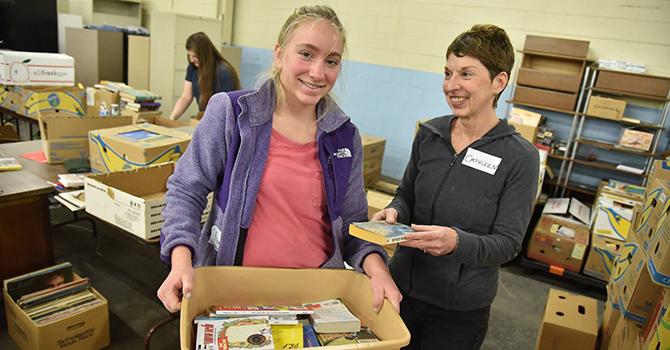From the Dean: How I Got Here

Cathleen M. Connell
Interim Dean, School of Public Health; Professor, Department of Health Behavior and Health Education
I was walking across campus the other day when something caused me to stop and think, "How did I get here?"
Not how I got to Ann Arbor but here here, as in how did I get to be the interim dean of the University of Michigan School of Public Health? I care deeply about the people here and our mission of creating a healthier, more equitable world for all. But you could not have predicted from how I grew up, or my high school or undergraduate experiences, that I would end up as the interim dean at a school of public health, let alone at the University of Michigan.
In light of these recent reflections, I want to share more with you about who I am and how I got here.
I was born and raised in Pottstown, Pennsylvania, home to Kiwi Shoe Polish and Mrs. Smith Pies. My father worked in a glass manufacturing plant his whole life—it was hard labor. My mom tended to our home and her eclectic garden. We did not have a lot of extras, but I was surrounded by love from my parents, siblings, and aunts and uncles.
I really enjoyed school. From my earliest memories I was determined to be a strong student. I applied (and was accepted) to only one college—Juniata College in Huntingdon, Pennsylvania. I was one of 1,200 students there and made some very dear friends. That is also where I took a course on aging, and you could say that my life pivoted then and there.
I was inspired by my professor Dr. Duane Stroman to further my studies on aging. I had grown up without grandparents, and I sensed there was a gap in my life. I always felt drawn to older people and, with my love for school, decided to further my education with a focus on adult development and aging.
I knew I did not want to be a physician, but I wanted to study health. So I went to Penn State University for a PhD. At Penn State and Juniata, public health was not yet a lens for my work and research. It wasn't until a post-doc at Washington University in St. Louis that I stumbled into public health work.
My post-doctoral research was in cardiovascular risk reduction. I worked on a diabetes project where I interviewed older adults living in very challenging situations. Our interactions were so authentic, and for the first time I truly realized that the environment they were living in and other structural factors should inform our approach to care. This was public health. This is public health.
As my post-doc was coming to an end, I found an opportunity at the University of Michigan School of Public Health that aligned with my interests. But I still found it strange to be pursuing public health work, thinking that I didn't quite fit in. Despite my enlightenment in St. Louis, public health still didn't feel like my realm. Fortunately, after a few twists and turns, my husband and I arrived in Ann Arbor in 1989 and I became a public health professional.
Much of my research over the past few decades has focused on how family members are affected by dementia. One of my projects offers art-making to people with early-stage dementia—creating art is a way to invest in abilities rather than focus on deficits.
During my time at Michigan, I have been lucky to serve as the associate dean for academic affairs and as chair of the Health Behavior and Health Education department. It is this administrative experience along with my passion for this School that have helped me feel prepared for my tenure as interim dean for the 2017–18 academic year.
We have an exciting year unfolding. An important initiative Michigan Public Health is leading across campus is precision health. You can read more about it in many of the print and digital materials you will see from us in the coming months.
Just as I asked how I got here, I have found myself questioning my role in precision health given my research focus. Up until very recently, I thought that precision health was for someone else.
But my thinking has evolved, and I think as we learn more about precision health, we will see how all of us at Michigan Public Health contribute to precision health. For me, the key is in how our work turns from the population-level to the individual and then back again in a continuum of care. A project I am working on right now translates an evidence-based intervention to address heart disease among older adults in Detroit. It made me think, "I might be doing precision health!"
We need to continue building bridges to scholars like myself to help them understand how they fit into precision health and what puzzle pieces they can place.
This is an important and timely initiative for our School and for the University. I am committed to moving our school forward on precision health and on several other initiatives in a productive way so that our next dean can lead us into a strong and steady future.
To do that, I'll need your help. Show leadership, tolerance, and patience in all you do. Share your voice with us and with others. Invest in our students and their world beyond the classroom.
This time next year, I look forward to thinking not about how I got here but about how far we have come.
This article first appeared in the fall 2017 issue of Findings, the magazine of the University of Michigan School of Public Health.
- Learn more about Health Behavior and Health Education at Michigan Public Health.
- Support academic achievement at Michigan Public Health.
- Read about epigenomics, a central field in precision health.
About the Author
 Cathleen M. Connell, PhD, is Interim Dean of the School of Public Health and Professor of Health Behavior
and Health Education. Since joining the school in 1989, she has also served as the
associate dean for academic affairs and as chair of the Health Behavior and Health
Education department. Her research focuses on the psychological and social context
of chronic disease self-management and dementia caregiving.
Cathleen M. Connell, PhD, is Interim Dean of the School of Public Health and Professor of Health Behavior
and Health Education. Since joining the school in 1989, she has also served as the
associate dean for academic affairs and as chair of the Health Behavior and Health
Education department. Her research focuses on the psychological and social context
of chronic disease self-management and dementia caregiving.
